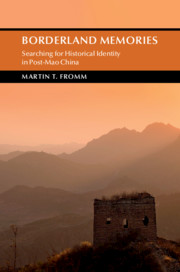Book contents
- Borderland Memories
- Cambridge Studies in the History of the People’s Republic of China
- Studies of the Weatherhead East Asian Institute, Columbia University
- Borderland Memories
- Copyright page
- Dedication
- Contents
- Acknowledgments
- Introduction
- 1 Reconfiguring Cultural Production in the Post-Mao Transition
- 2 Borderland Ambiguities in Narratives of Modernization and Liberation
- 3 Relocating the Nation outside the Nation
- 4 The “Historical Science” of Wenshi Ziliao
- 5 Affective Community and Historical Rehabilitation
- 6 Mobilizing a “Patriotic United Front”
- 7 Local, Regional, and National Dynamics of Wenshi Ziliao Production
- Conclusion
- References
- Index
- Studies of the Weatherhead East Asian Institute, Columbia University
Conclusion
Published online by Cambridge University Press: 18 February 2019
- Borderland Memories
- Cambridge Studies in the History of the People’s Republic of China
- Studies of the Weatherhead East Asian Institute, Columbia University
- Borderland Memories
- Copyright page
- Dedication
- Contents
- Acknowledgments
- Introduction
- 1 Reconfiguring Cultural Production in the Post-Mao Transition
- 2 Borderland Ambiguities in Narratives of Modernization and Liberation
- 3 Relocating the Nation outside the Nation
- 4 The “Historical Science” of Wenshi Ziliao
- 5 Affective Community and Historical Rehabilitation
- 6 Mobilizing a “Patriotic United Front”
- 7 Local, Regional, and National Dynamics of Wenshi Ziliao Production
- Conclusion
- References
- Index
- Studies of the Weatherhead East Asian Institute, Columbia University
Summary
During my research for this book, a librarian commented on the continuing production of wenshi ziliao in China today. His evaluation was that the new crop of wenshi ziliao is not as high in quality or as valuable as the materials produced in the earlier phase. He reasoned that most of the people who had experienced important historical events had passed away, and that the historical writing is not as rich. Was there an implicit suggestion that wenshi ziliao “truths” about the post-1949 period are less authentic and more contrived than memories of the pre-Communist period that could be articulated more flexibly and with less stringent political constraints? In the post-transition period of a rising neoliberal authoritarianism, have wenshi ziliao lost their capacity to accommodate, mobilize, and reconcile multiple “truths” about the past?
- Type
- Chapter
- Information
- Borderland MemoriesSearching for Historical Identity in Post-Mao China, pp. 255 - 260Publisher: Cambridge University PressPrint publication year: 2019

